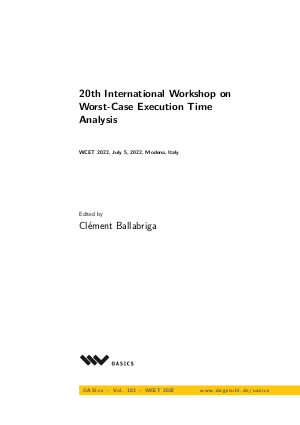OASIcs, Volume 103
20th International Workshop on Worst-Case Execution Time Analysis (WCET 2022)
-
Part of:
Series:
Open Access Series in Informatics (OASIcs)
Conference: Workshop on Worst-Case Execution Time Analysis (WCET)

Event
Editor
Publication Details
- published at: 2022-07-14
- Publisher: Schloss Dagstuhl – Leibniz-Zentrum für Informatik
- ISBN: 978-3-95977-244-0
- DBLP: db/conf/wcet/wcet2022
Access Numbers
- Detailed Access Statistics available here
-
Total Accesses (updated on a weekly basis)
0Documents
Documents
OASIcs, Volume 103, WCET 2022, Complete Volume
Abstract
Cite as
20th International Workshop on Worst-Case Execution Time Analysis (WCET 2022). Open Access Series in Informatics (OASIcs), Volume 103, pp. 1-54, Schloss Dagstuhl – Leibniz-Zentrum für Informatik (2022)
Copy BibTex To Clipboard
@Proceedings{ballabriga:OASIcs.WCET.2022,
title = {{OASIcs, Volume 103, WCET 2022, Complete Volume}},
booktitle = {20th International Workshop on Worst-Case Execution Time Analysis (WCET 2022)},
pages = {1--54},
series = {Open Access Series in Informatics (OASIcs)},
ISBN = {978-3-95977-244-0},
ISSN = {2190-6807},
year = {2022},
volume = {103},
editor = {Ballabriga, Cl\'{e}ment},
publisher = {Schloss Dagstuhl -- Leibniz-Zentrum f{\"u}r Informatik},
address = {Dagstuhl, Germany},
URL = {https://drops.dagstuhl.de/entities/document/10.4230/OASIcs.WCET.2022},
URN = {urn:nbn:de:0030-drops-166218},
doi = {10.4230/OASIcs.WCET.2022},
annote = {Keywords: OASIcs, Volume 103, WCET 2022, Complete Volume}
}
Front Matter, Table of Contents, Preface, Conference Organization
Abstract
Cite as
20th International Workshop on Worst-Case Execution Time Analysis (WCET 2022). Open Access Series in Informatics (OASIcs), Volume 103, pp. 0:i-0:x, Schloss Dagstuhl – Leibniz-Zentrum für Informatik (2022)
Copy BibTex To Clipboard
@InProceedings{ballabriga:OASIcs.WCET.2022.0,
author = {Ballabriga, Cl\'{e}ment},
title = {{Front Matter, Table of Contents, Preface, Conference Organization}},
booktitle = {20th International Workshop on Worst-Case Execution Time Analysis (WCET 2022)},
pages = {0:i--0:x},
series = {Open Access Series in Informatics (OASIcs)},
ISBN = {978-3-95977-244-0},
ISSN = {2190-6807},
year = {2022},
volume = {103},
editor = {Ballabriga, Cl\'{e}ment},
publisher = {Schloss Dagstuhl -- Leibniz-Zentrum f{\"u}r Informatik},
address = {Dagstuhl, Germany},
URL = {https://drops.dagstuhl.de/entities/document/10.4230/OASIcs.WCET.2022.0},
URN = {urn:nbn:de:0030-drops-166227},
doi = {10.4230/OASIcs.WCET.2022.0},
annote = {Keywords: Front Matter, Table of Contents, Preface, Conference Organization}
}
StAMP: Static Analysis of Memory Access Profiles for Real-Time Tasks
Abstract
Cite as
Théo Degioanni and Isabelle Puaut. StAMP: Static Analysis of Memory Access Profiles for Real-Time Tasks. In 20th International Workshop on Worst-Case Execution Time Analysis (WCET 2022). Open Access Series in Informatics (OASIcs), Volume 103, pp. 1:1-1:13, Schloss Dagstuhl – Leibniz-Zentrum für Informatik (2022)
Copy BibTex To Clipboard
@InProceedings{degioanni_et_al:OASIcs.WCET.2022.1,
author = {Degioanni, Th\'{e}o and Puaut, Isabelle},
title = {{StAMP: Static Analysis of Memory Access Profiles for Real-Time Tasks}},
booktitle = {20th International Workshop on Worst-Case Execution Time Analysis (WCET 2022)},
pages = {1:1--1:13},
series = {Open Access Series in Informatics (OASIcs)},
ISBN = {978-3-95977-244-0},
ISSN = {2190-6807},
year = {2022},
volume = {103},
editor = {Ballabriga, Cl\'{e}ment},
publisher = {Schloss Dagstuhl -- Leibniz-Zentrum f{\"u}r Informatik},
address = {Dagstuhl, Germany},
URL = {https://drops.dagstuhl.de/entities/document/10.4230/OASIcs.WCET.2022.1},
URN = {urn:nbn:de:0030-drops-166231},
doi = {10.4230/OASIcs.WCET.2022.1},
annote = {Keywords: Worst-Case Execution Time Estimation, Static Analysis, Multicore, Interference, Implicit Path Enumeration Technique}
}
LLVMTA: An LLVM-Based WCET Analysis Tool
Abstract
Cite as
Sebastian Hahn, Michael Jacobs, Nils Hölscher, Kuan-Hsun Chen, Jian-Jia Chen, and Jan Reineke. LLVMTA: An LLVM-Based WCET Analysis Tool. In 20th International Workshop on Worst-Case Execution Time Analysis (WCET 2022). Open Access Series in Informatics (OASIcs), Volume 103, pp. 2:1-2:17, Schloss Dagstuhl – Leibniz-Zentrum für Informatik (2022)
Copy BibTex To Clipboard
@InProceedings{hahn_et_al:OASIcs.WCET.2022.2,
author = {Hahn, Sebastian and Jacobs, Michael and H\"{o}lscher, Nils and Chen, Kuan-Hsun and Chen, Jian-Jia and Reineke, Jan},
title = {{LLVMTA: An LLVM-Based WCET Analysis Tool}},
booktitle = {20th International Workshop on Worst-Case Execution Time Analysis (WCET 2022)},
pages = {2:1--2:17},
series = {Open Access Series in Informatics (OASIcs)},
ISBN = {978-3-95977-244-0},
ISSN = {2190-6807},
year = {2022},
volume = {103},
editor = {Ballabriga, Cl\'{e}ment},
publisher = {Schloss Dagstuhl -- Leibniz-Zentrum f{\"u}r Informatik},
address = {Dagstuhl, Germany},
URL = {https://drops.dagstuhl.de/entities/document/10.4230/OASIcs.WCET.2022.2},
URN = {urn:nbn:de:0030-drops-166242},
doi = {10.4230/OASIcs.WCET.2022.2},
annote = {Keywords: WCET analysis, low-level analysis, LLVM}
}
DELOOP: Automatic Flow Facts Computation Using Dynamic Symbolic Execution
Abstract
Cite as
Hazem Abaza, Zain Alabedin Haj Hammadeh, and Daniel Lüdtke. DELOOP: Automatic Flow Facts Computation Using Dynamic Symbolic Execution. In 20th International Workshop on Worst-Case Execution Time Analysis (WCET 2022). Open Access Series in Informatics (OASIcs), Volume 103, pp. 3:1-3:12, Schloss Dagstuhl – Leibniz-Zentrum für Informatik (2022)
Copy BibTex To Clipboard
@InProceedings{abaza_et_al:OASIcs.WCET.2022.3,
author = {Abaza, Hazem and Haj Hammadeh, Zain Alabedin and L\"{u}dtke, Daniel},
title = {{DELOOP: Automatic Flow Facts Computation Using Dynamic Symbolic Execution}},
booktitle = {20th International Workshop on Worst-Case Execution Time Analysis (WCET 2022)},
pages = {3:1--3:12},
series = {Open Access Series in Informatics (OASIcs)},
ISBN = {978-3-95977-244-0},
ISSN = {2190-6807},
year = {2022},
volume = {103},
editor = {Ballabriga, Cl\'{e}ment},
publisher = {Schloss Dagstuhl -- Leibniz-Zentrum f{\"u}r Informatik},
address = {Dagstuhl, Germany},
URL = {https://drops.dagstuhl.de/entities/document/10.4230/OASIcs.WCET.2022.3},
URN = {urn:nbn:de:0030-drops-166256},
doi = {10.4230/OASIcs.WCET.2022.3},
annote = {Keywords: Real-Time, WCET, Symbolic execution}
}